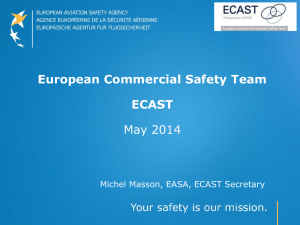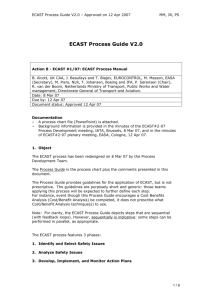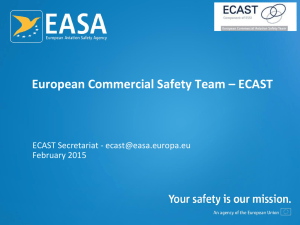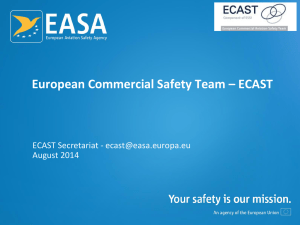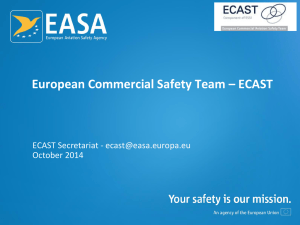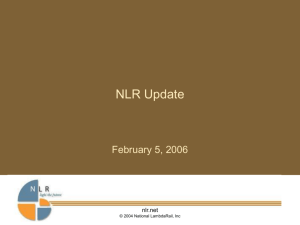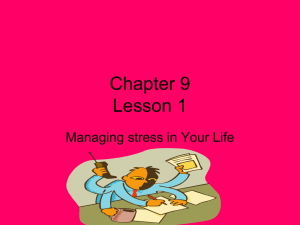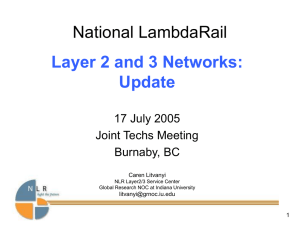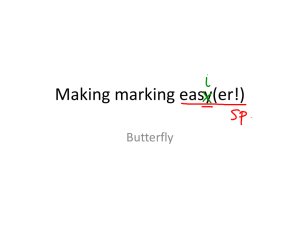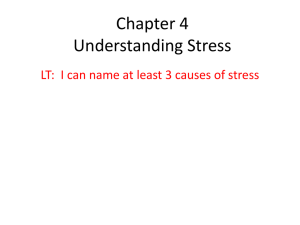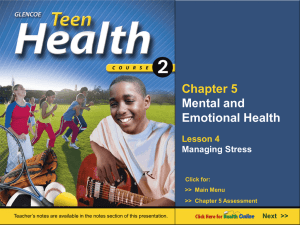Chapter 5 Human Performance and Limitations
advertisement
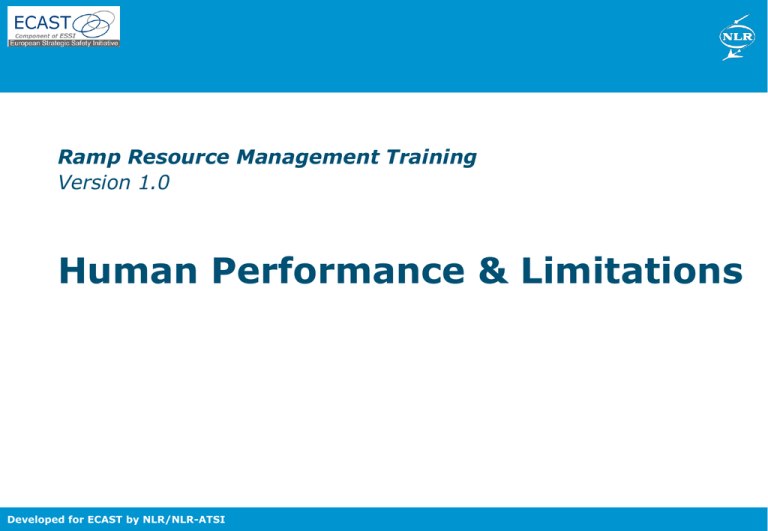
Ramp Resource Management Training Version 1.0 Human Performance & Limitations Nationaal LuchtRuimtevaartlaboratorium – National Aerospace Laboratory NLR Developed for ECAST by en NLR/NLR-ATSI Human Performance & Limitations Developed for ECAST by NLR/NLR-ATSI 2 Topics Safety regulations Teamwork Team dynamics Leadership Communication Team situational awareness Cultural, ethnic and educational differences Threat and error management Human performance Stress Fatigue Alcohol, medicines and drugs Developed for ECAST by NLR/NLR-ATSI 3 Stress “The total absence of stress is death” Dr. Selye; pioneer in human stress research Developed for ECAST by NLR/NLR-ATSI 4 Stress: 4 categories physical stressors noise, temperature............ physiological stressors sick, lack of sleep............ psychological stressors time pressure, work pressure, emotional factors......... psycho-social stressors personal relationship problems......... Cumulative! Developed for ECAST by NLR/NLR-ATSI 5 Stress Reactions 1. Physical Increased heart rate Tremors Feeling hot 2. Emotional /Behaviour Anger Quiet Nervous behaviour (tapping) 3. Cognitive (Thinking) Less capacity Slower thinking process Forgetting Developed for ECAST by NLR/NLR-ATSI 6 Stress and performance P Stress Developed for ECAST by NLR/NLR-ATSI 7 Personal examples of stressors 8 Developed for ECAST by NLR/NLR-ATSI Stress through time Pressure • What is the influence of time pressure on job performance? • What are possible causes of time pressure? Developed for ECAST by NLR/NLR-ATSI 9 Stress reactions: coping • Active • Palliative reaction: smoking, relaxing... (Vodka!) • Avoidance (humour) • Emotional expression: anger.... • Social support • Passive: depression • Comforting thoughts 10 Developed for ECAST by NLR/NLR-ATSI Active stress management Being aware of negative effects of time pressure Sufficient resources Planning & preparation Setting boundaries Solve personal problems (!) Recognise and reduce self-induced stress Use colleagues spare capacity Developed for ECAST by NLR/NLR-ATSI 11 Fatigue Developed for ECAST by NLR/NLR-ATSI 12 Driving ...................and just a bit of sleeping http://www.youtube.com/watch?v=mIcG2lnDmqk Developed for ECAST by NLR/NLR-ATSI 13 Developed for ECAST by NLR/NLR-ATSI 14 Fatigue How do you recognise signs of fatigue? Yourself Others Developed for ECAST by NLR/NLR-ATSI 15 Fatigue management EMPLOYER RESPONSIBILITIES EMPLOYEE RESPONSIBILITIES Ensuring safe work practices Fitness for work (e.g. adequate rest (e.g. Sensible overtime procedures). and recuperation). Ensuring good work systems (e.g. scheduling work at appropriate times of the day). Appropriate and safe roster design to allow for adequate recuperation. Lifestyle management (including the use of drugs and alcohol). Incidence reporting (of fatigue- related incidents). Sleep well Appropriate and safe shift length. SHARED RESPONSIBILITY! http://www.mirsa.com.au/docs/Fatigue_Management.pdf Developed for ECAST by NLR/NLR-ATSI 16 Fatigue management DO Don’t Eat your main meal at midday Eat large meals in the middle of the or early evening. Eat light meals at night. Allow at least three hours to digest food before sleep. Eat pasta, grains, sandwiches, night. Eat food high in sugar and fat, especially ‘fast food’. Eat lots of protein at night, such as red meat, as it is difficult to digest. salads etc. at night as they are easily digested. Drink reasonable amounts of liquid. http://www.mirsa.com.au/docs/Fatigue_Management.pdf Developed for ECAST by NLR/NLR-ATSI 17 Alcohol, Medicines and drugs Developed for ECAST by NLR/NLR-ATSI 18

